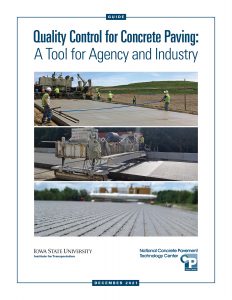InTrans / Dec 02, 2021
CP Tech Center publishes Quality Control for Concrete Paving guide

Texturing machine (University of North Carolina at Charlotte, used with permission)
“What gets measured gets managed” is a common adage in quality management.
Thus, the core of every successful quality control (QC) program for contractors and material suppliers is monitoring key quality characteristics and instituting a process for continuous improvement of those characteristics and of the QC process itself. QC is an integral component of a transportation agency’s quality assurance (QA) program and supports the construction of quality concrete infrastructure.
To help contractors develop or enhance their existing QC programs and plans and to familiarize agencies with the components of QC for concrete paving projects, the National Concrete Pavement Technology Center (CP Tech Center) recently published Quality Control for Concrete Paving: A Tool for Agency and Industry, available here.
“This document is intended to serve as a tool that can be used at the batch plant, behind the paver, and at other locations on the job,” reads the introduction to the guide.
The three authors of the guide are Tara L. Cavalline, PhD, PE, of the University of North Carolina at Charlotte; Gary J. Fick, of The Transtec Group, Inc.; and Al Innis, a consultant. The guide was published with funding from and as part of the Federal Highway Administration cooperative agreement Advancing Concrete Pavement Technology Solutions.
A key aim of the guide is to present the information necessary for contractors to do the following:
- Understand common agency QC requirements
- Develop and implement the appropriate tools, processes, and procedures to meet agency QC requirements
- Develop and implement continuous improvement activities to more effectively and efficiently meet agency requirements
- Recognize that good quality control offers several benefits for contractors, including higher efficiency and productivity, increased profit, and safer operations
Though the primary target audience is contractors, the guide can also help agency personnel become familiar with the components and approaches that comprise a comprehensive QC plan for concrete paving projects, the ways such a QC plan benefits an agency, and ways to appropriately incorporate QC requirements into specifications.
Effective QC programs and plans are expected to become an increasingly important component of project QA as agencies move to implement performance-type specification provisions.
“Though agencies have various requirements for contractor QC during construction, they are only the minimum provisions that should be considered, and additional QC activities are almost always needed to ensure that risk is mitigated and a quality pavement is constructed,” said Cavalline.
However, the guide does not mandate that a contractor implement the outlined QC activities in a certain way.
“A successful contractor QC program engages the appropriate personnel, manages the necessary processes, measures what matters, and uses the appropriate test methods,” said Cavalline.
Complementary publications developed by the CP Tech Center include Integrated Materials and Construction Practices (IMCP) for Concrete Pavement: A State-of-the-Practice Manual (2019), Guide to Concrete Overlays (2021), and Concrete Pavement Preservation Guide (new edition forthcoming). These and other publications related to concrete paving are available on the CP Tech Center’s website, https://cptechcenter.org/.
